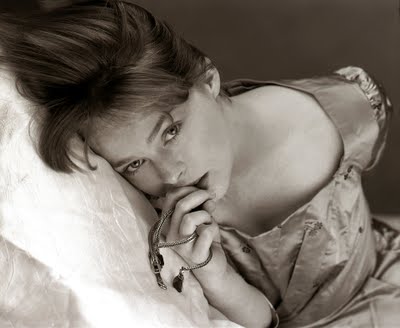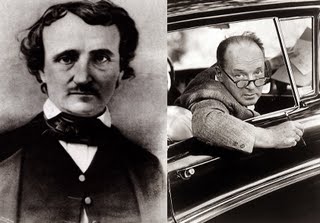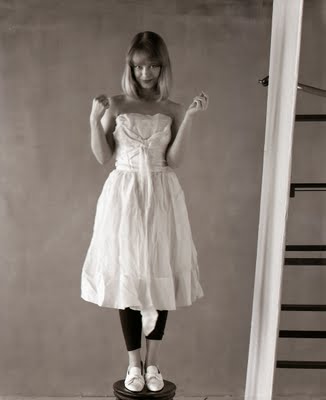She was Lo, plain Lo, in the morning, standing four feet ten in one sock. She was Lola in slacks. She was Dolly at school. She was Dolores on the dotted line. But in my arms she was always Lolita.
Chapter 1, Lolita by Vladimir Nabokov

Some months back I took my two granddaughters to an Arts Club production of a musical called Nevermore: The Imaginary Life and Mysterious Death of Edgar Allan Poe. Even Lauren who is 8 managed to enjoy the musical play. She liked the costumes which resembled a modern Goth version of Alice in Wonderland. Rebecca had many questions on Edgar Allan Poe so I read The Telltale Heart to her after dinner. I did not do as a good a job as Iggy Pop and she found Poe a bit on the dull and repulsive side. She thought the Vincent Price version of The Fall of the House of Usher, renamed The House of Usher was cheesy. But at age 12 she knows more about Poe than the average 12-year-old and perhaps Poe might grow on her in the future.
My interest in Edgar Allan Poe began in 1957 when one of my English teacher Brothers of the Holy Cross at St Ed’s High School in Austin, Texas played a record in class. It was James Mason narrating Poe’s Annabel Lee. It was only a few weeks ago that I found the recording on one web page and as par for the course in this day and age of Google there is no information on date and record label. In fact my searches have taken me nowhere.
But I have a vivid memory of that recording but not vivid enough to remember that the recording had music in the background.
Thanks to James Mason I became a lifelong fan of all things Poe. I have read everything Poe wrote.
Of late I have read books in which Poe is a character such as in Matthew Pearl’s The Poe Shadow and Louis Bayard’s Pale Blue Eyes. The former is an extremely convoluted novel and the latter a bit more satisfying in which Poe, as a young cadet in West Point, assists a famous investigator after several brutal murders occur at the school.
I also liked Laura Lippman’s In A Strange City, 2001 (a novel in her series in which the main protagonist is a young female journalist-turned-investigator who lives in Baltimore, where Poe died and is buried). The novel centres around the well-known Baltimore ritual: Every year, on Edgar Allan Poe's birthday, a mysterious figure visits the writer's grave, leaving behind three roses and a bottle of cognac. When Tess gets wind of a plot to unmask the so-called Poe Toaster, she decides to stand guard. To her amazement, two visitors approach -- and one is shot and killed.
Some reader’s might know that for the first time ever the Poe Toaster did not show up this year on January 19.
I enjoyed a the 1951 film The Man With the Cloak (based on a short story, The Gentleman in Paris, by John Dickson Carr) with Joseph Cotten, Barbara Stanwyck, Leslie Caron and Louis Calhern. Cotton plays a failed poet called Dupin (!).At the end of the film, when Madeline (! The Fall of the House of Usher), played by Leslie Caron, goes looking for Dupin at a bar to thank him for a service rendered. Dupin's generous bartender Flaherty (Jim Backus) tells her he has gone, leaving only a seemingly worthless IOU for his sizable bar bill. On one side is a draft of a verse about a woman named Annabel Lee and the IOU's signature, which reveals Dupin's real name: Edgar Allan Poe.
While researching a bit of Poe to explain to Rebecca, I found out the hitherto (for me!) connection between Edgar Allan Poe and Vladimir Nabokov. It seems that the novel (published in Paris in 1955) was going to be originally called A Kingdom by the Sea. Humbert Humbert’s first love (unconsummated) is a young girl called Annabel Leigh.

This has led me to be currently reading The Annotated Lolita, Edited and with a preface by Alfred Appel, Jr. Two bookmarks are compulsory equipment here to keep track of all the footnotes, explanations, parody, coincidences (probably all intentional on the part of Nabokov) of this annotated version.
This Lolita came to me via former Vancouver Magazine associate editor (“Rock’roll died after the Beatles.”) and Nabokov scholar, Don Stanley. Three weeks ago the door bell rang at 8 in the evening. I opened the door to Don Stanley and wife. He said, “I have something for you,” and handed me the annotated version of Lolita.

One mystery remains for me. Since we know Nabokov published Lolita in 1955 (Olympia Press, Paris). When did James Mason record his reading of Poe’s Annabel Lee? Was the recording a possible reason Mason was chosen for the role of Humbert Humbert in Kubrick’s film Lolita in 1962? Or was it all Nabokovian coincidence?
The stand-in for Lolita here is Vancouver actress and mother of two, Corrie Clark. Clark recently conveyed to me the following:
These days I am working hard on screenwriting, among the days of motherhood. I am currently writing a screenplay about Emily Carr and again, ironically her
relationship as a 'surrogate mother' to a little girl who eventually lived with her for a few years when she was ...yes, 12.